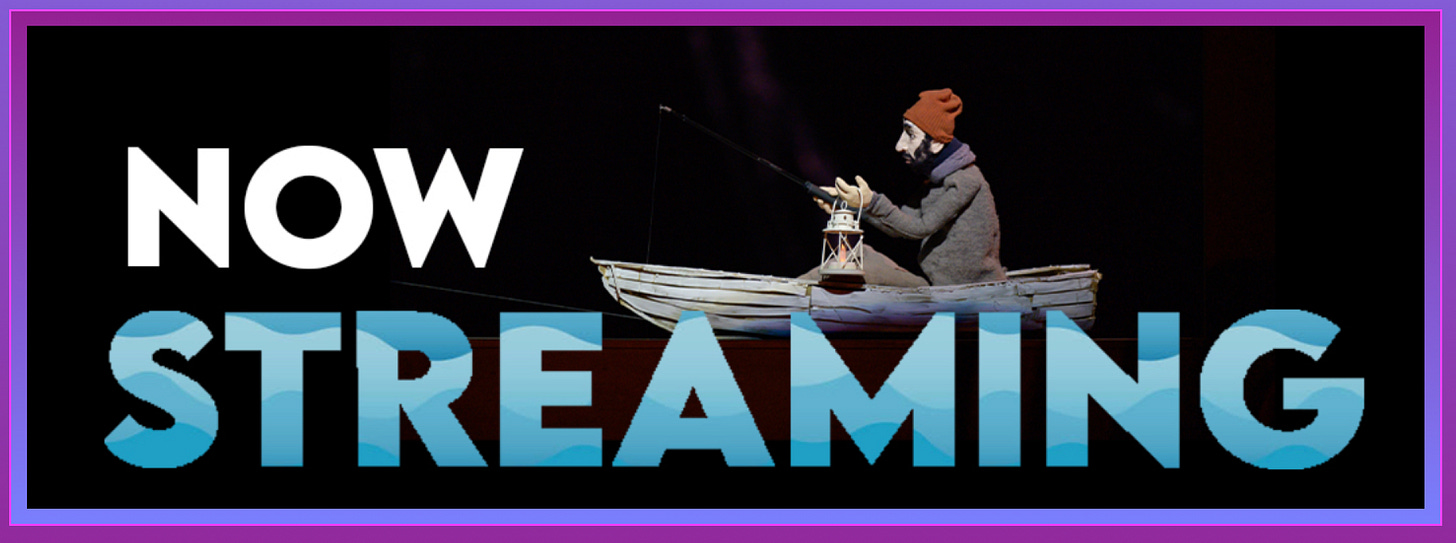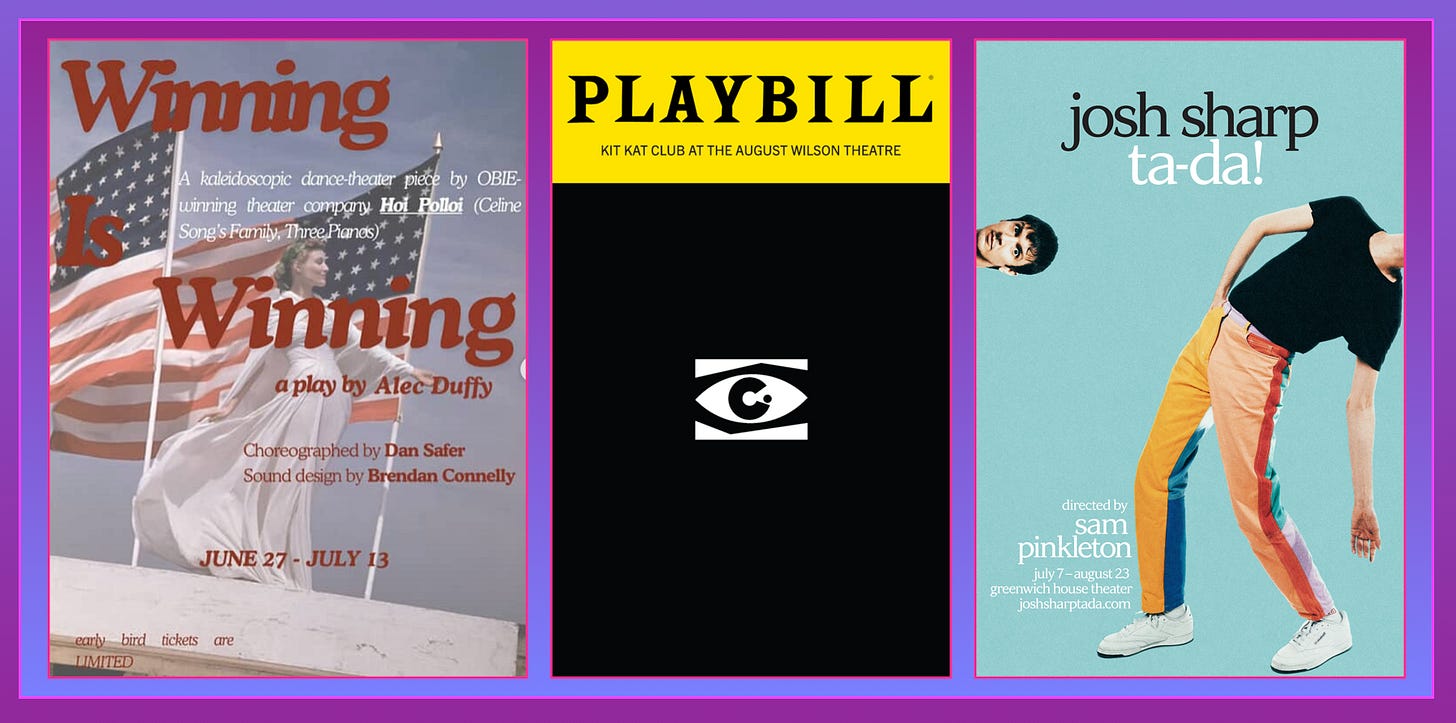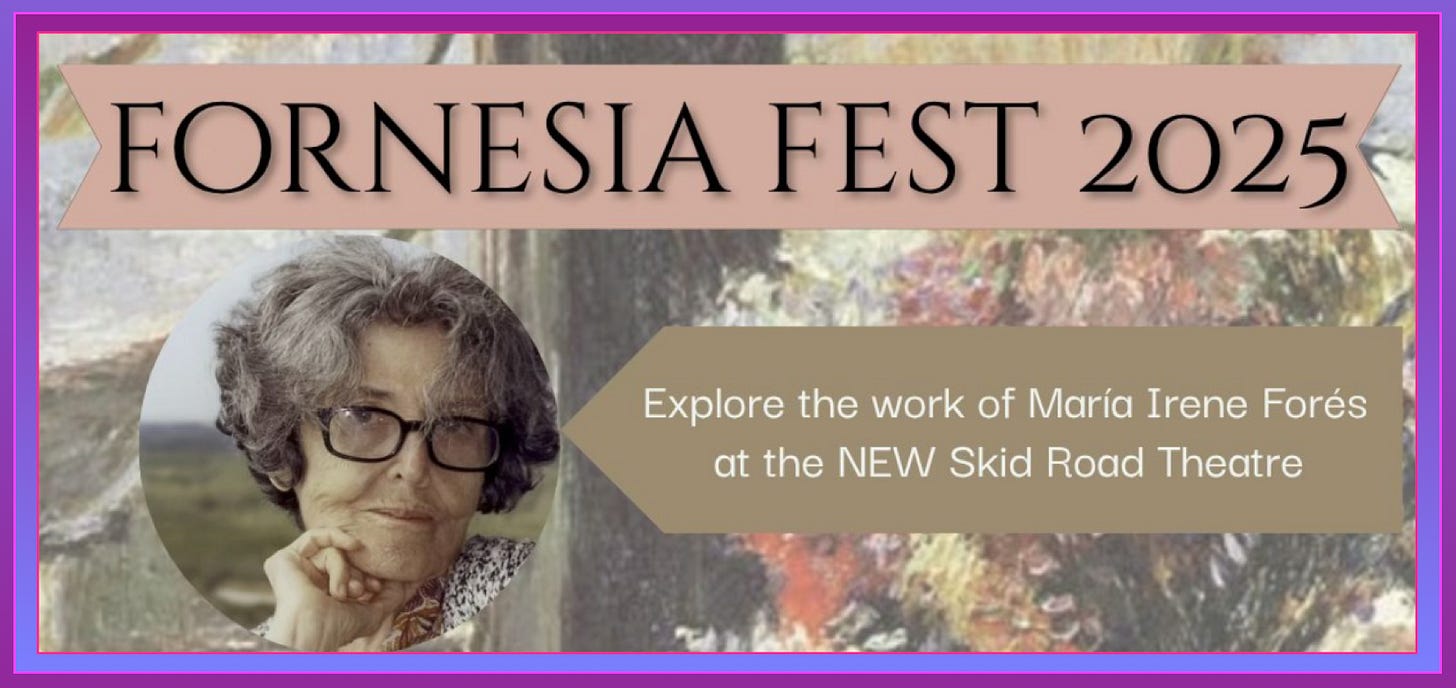#250713 ~ History, Genre, Scale
Brian Eugenio Herrera's #TheatreClique Newsletter for July 13, 2025.
WELCOME to #TheatreClique — my emphatically intermittent newsletter dedicated to encouraging you to click out to some of the most interesting, intriguing & noteworthy writing about drama, theatre & performance (at least, so says me)…
This Week's #TheatreCliquery:
This installment of #TheatreClique links out to pieces that take up questions of history, genre, and scale. And for this week’s opener, I lift this cover of an old chestnut by “The Highgay Men” — an unofficial group of out country singers led by Orville Peck and including Waylon Payne, Fancy Hagood, and T.J. Osborne. …and if clicking the image below routes to an error message, try clicking here.
EDITOR’S NOTE: whenever possible, whenever linking to paywalled pieces, I try to “gift” the article to #TheatreClique readers. In other words, clicking out to articles in the New York Times, Washington Post, Philadelphia Inquirer, Atlantic, and Wall Street Journal should neither present hassle nor burn through your current allotment of free views. Here’s hoping more outlets — hello LATimes! hi NewYorkMagazine! yo NewYorker!— adopt similar technologies for subscribers soon...
#NowClickThis…
Wherein I highlight a handful of the most click-worthy links I’ve encountered in the last few…
at Time, scholar/writer Charlotte Canning tells the story of how the 1955/57 play Inherit the Wind became “an enduring inspiration for those who fight for knowledge over dogma, reason over fanaticism, and freedom over censorship”;
at High Drama, freelance arts writer Louis Peitzman offers a tutorial on what makes a “jukebox musical” theatrically worthwhile;
at Backstage, arts writer Casey Mink talks to Just in Time’s intimacy director Leigh Zimmerman about the relevance of techniques and principles of intimacy direction in shows with lots of audience interaction;
at Fourth Wall, writer/performer Matt Rodin talks to the Broadway League’s Jake Miaczynski about how the Jimmy Awards went from “cult-fave to cultural force”;
at HowlRound, performance artist/curator Viktor Visilov reflects on how queer performance-makers in Russia are— in the interest of safety, necessity, and community — reviving the Soviet-era kvartirnik or “a concert or performance held in private apartments”);
Vanity Fair France’s Pierre Groppo peers into the elaborate workings of producer/fashionista Jordan Roth’s performance installation Radical Acts of Unrelenting Beauty, recently presented at Musée du Louvre as part of Paris Fashion Week;
at Cracked, freelance entertainment writer Tim Grierson talks to filmmaker Rowan Haber and performer/writer Julia Sweeney about the history of trans comedy and their collaboration on Haber’s new documentary film, We Are Pat.
Now Streaming on a Device Near You:
Wherein I highlight notable opportunities to engage what I call “remote performance”…
The League of Streaming Theatre is presenting a pro-shot capture of The Wilma’s production of Jon Fosse’s A Summer Day — the one I so admired — for on-demand viewing through July 27, 2025. Enter WILMA5 at checkout for $5 discount; regular price is $39, including fees.
Thoughts from That One Theatregoer Who Likes Pretty Much Everything:
Wherein I offer capsule commentaries on what I liked best — my HIGH-LIKES if you will — about the shows I’ve recently engaged...
#92: Winning Is Winning
Conceived, Written and Directed by Alec Duffy • Choreography by Dan Safer • NYC, Off-Off-Broadway : Hoi Polloi & ¡OYE! Group at JILL@JACK • July 2025.
In this collage-like fugue of a dance-theater piece, an intergenerational ensemble of more than twenty performers dance, speak, sing, chant, and move through the chaotic swirl of feelings stirred by the recent U.S. election. The piece begins with an extended tableau of the company — frozen, apparently mid-shriek, and facing the audience for maybe a minute. The suspense of this captivating durational spectacle elicits occasional titters before the sigh of collective relief that comes as the ensemble breaks the tableau and commences a series of passages — some choral speaking, some choreographed dance, some contact improv, etcetera… None which never really end, but instead “cross-fade” from one to the other, as they toy with the question/concept/challenge of sustaining and surviving in community. But sometime around halfway mark, the sweet delight of simply watching the fascinating ensemble starts to turn to something far more vinegary. The early motif of a group dissolving as individual members fall away begins to feel more urgent, more devastating. The opening tableau of frozen panic reconstitutes but, this time, ensemblist Kristen Hoffman starts to scream intermittently, the musicality of their soaring vocality by turns beautiful and hilarious and terrifying. The tableau breaks again but the passages that follow blur, becoming incrementally darker, infused with rising sense of anxiety and dread. In maybe the climactic sequence, a dancer (the blazing Maria Franco) pulls themselves from the previous passage’s zombie-like muck and launches themselves into a virtuosic, hurling, screaming dance solo. And sometime, maybe not long after, maybe right before, someone turns off the A/C. Then sometime after that director/compositor Alec Duffy breaks the theatrical container that has so held both the audience and the ensemble. First, the space into plunges into complete darkness as someone we have not yet seen speaks piece’s longest passage of spoken text (a literally enthralling Jason Quarles). Then, the fourth wall shatters from behind with one final, deeply disconcerting act of irresolution… (This final fifteen minutes or so — the screaming, the stillness, the heat, the jarring noises — stirred an actual panic attack in the person seated next to me.) The piece offers its last resonant choral provocation — how/do/you/think/this/ends — as the doors to the lobby open. A startling, discomfiting work that will likely nag at my consciousness — and my conscience — for some while…
See also:
at The Brooklyn Rail in 2020, director/dramaturg/devisor Mei Ann Teo talks to (then) JACK artistic co-directors Alec Duffy and Jordana De La Cruz about JACK being a “sanctuary for art and activism”;
at BroadwayWorld, freelance theatre writer Joey Sims reports on how TikTok virality made a recent Hoi Polloi site-specific a breakout hit;
#93: Cabaret at the KitKatClub
Book by Joe Masteroff; Music & Lyrics by John Kander & Fred Ebb • Directed by Rebecca Frecknall • NYC, Broadway : August Wilson Theatre • July 2025.
I’ve recently become something of an Orville Peck fan (due perhaps to the spirit of collaboration highlighted in his epic 2024 duet album Stampede) which might be why I found myself increasingly curious to see Peck on Broadway — both to witness him work as part of an ensemble and to watch him inhabit Emcee’s startling series of “demon clown” personas in this Cabaret (which I found mostly perplexing when first experienced it in April 2024). Put plainly: Orville Peck is thrilling in Cabaret. His soaring bari-tenor unleashes the Emcee’s often latent but always gorgeous musicality, perhaps especially when the creepy flourish of Peck’s deep, guttural growl taps in as ominous counterpoint. Peck’s physicality, too, activates an emphatic masculinity within the emcee’s giddy queerness. (While I marveled at Eddie Redmayne’s angular, insect-like performance, I found it oddly bereft of sexuality. But if Redmayne’s Emcee was a little bit mantis, Peck’s is all man.) As for the rest of the production, I still find Frecknall’s conceptual loops perplexing; even so, the ensemble was possibly more captivating. Ensemblists Julian Ramos and Paige Smallwood — on for Cliff and Sally, respectively, at my matinee — were sweetly endearing, reminding me of both characters’s youth, while the still-stunning Stephen Skybell (now opposite the haunting Ellen Harvey) ably hold this Cabaret’s tender heart as Herr Schulz and Fraulein Schneider. So I count myself glad to have revisited Cabaret at the Kit Kat Club before it closes and thrilled by the Orville Peck Broadway Experience.
See also:
at The New York Times (in March 2025), freelance culture writer Erik Piepenburg talks to queer country singer Orville Peck about whether his emcee would be masked or unmasked wear Peck’s signature mask;
at OUT Magazine, freelance journalist C. Taylor Henderson talks to Orville Peck about what he “learned from unmasking in Broadway's Cabaret at the Kit Kat Club”;
#94: Ta-Da!
Written and performed by Josh Sharp • Directed by Sam Pinkleton • Magic by Skylar Fox • NYC, Off-Broadway at Greenwich House Theater • July 2025.
A deceptively simple bit of theatrical wonder from queer alt-comedy star Josh Sharp and director Sam Pinkleton. Billed (not incorrectly) as a “one-man comedy show inside of a manic 2000 slide PowerPoint,” Sharp’s title Ta-Da! — a pair of nonsense syllables that might convey a magician’s announcement, a surprise reveal, or the arrival of something faaabulous — evinces comedy’s sleight-of-hand capacity for mining delight from incongruity, simultaneity, and paradox. The title also elegantly captures the surprisingly layered conceptual arc of the show. What at first seems like a fun tech stunt — 2000 slides? Really? Really! — punctuated by high-concept gay-gay-gay-gaaaay jokes — “My experience being of light homophobic bullying on the subway, episode 3” — stealthily unfurls to become a tightly threaded and unexpectedly profound story of literal magic, actual near death experiences, and the test of memory (as both an emotional experience and cognitive reality). Ta-da! is that rare surprise of a show — one that starts with a cascade of lightly amused “ahhs” and concludes with a series of escalating waves (IYKYK) of “wows.” And like the best theatrical magic shows, Josh Sharp’s Ta-Da! doesn’t set out necessarily to stir emotion but to activate wonder — and thereby remind us of how truly wondrous life can be. Sidenote: with both Rheology and Ta-Da! on the scene this summer, theoretical physics is having quite the queer theatrical coming out party…
See also:
Playbill’s Logan Cullwell-Block reports briefly on Ta-Da!;
at CBC Arts, arts writer/curator Peter Knegt puts Sharp’s work in context with a survey of “the new queer comedy” movement.
And This Week in Fornésiana…
Wherein I highlight noteworthy recent or upcoming engagements with the life, work and legacy of legendary playwright, director and teacher María Irene Fornés...
For those in the Pacific Northwest, take note of Fornesia Fest — soon upcoming four-evening series of events that promise to “reveal different facets of Fornés creative life and her impact on American theatre.”
Film screenings! Narrative medicine workshops! Play readings! All Fornesia Fest events will take place at the new Skid Road Theatre, in partnership with Beneath the Streets, in Seattle's historic Pioneer Square.






